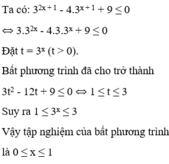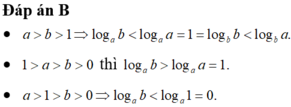
Hãy nhập câu hỏi của bạn vào đây, nếu là tài khoản VIP, bạn sẽ được ưu tiên trả lời.


\(1\le1+\sqrt{1-x^2}\le2\Rightarrow3\le3^{1+\sqrt{1-x^2}}\le9\)
Đặt \(3^{1+\sqrt{1-x^2}}=t\Rightarrow t\in\left[3;9\right]\)
Phương trình trở thành: \(t^2-\left(m+2\right)t+2m+1=0\)
\(\Leftrightarrow t^2-2t+1=m\left(t-2\right)\Leftrightarrow m=\dfrac{t^2-2t+1}{t-2}\)
Xét hàm \(f\left(t\right)=\dfrac{t^2-2t+1}{t-2}\) trên \(\left[3;9\right]\)
\(f'\left(t\right)=\dfrac{t^2-4t+3}{\left(t-2\right)^2}\ge0\) ; \(\forall t\in\left[3;9\right]\Rightarrow f\left(t\right)\) đồng biến trên khoảng đã cho
\(\Rightarrow f\left(3\right)\le f\left(t\right)\le f\left(9\right)\Rightarrow4\le m\le\dfrac{64}{7}\)
Có 6 giá trị nguyên của m
Cho e hỏi tại sao điều kiện lại nằm trong khoảng [1,2] vậy ạ ?

Đk: x khác 0;
pt \(\Leftrightarrow-9\cdot2^{\frac{1}{x}}-5\cdot2^{\frac{1}{x}}\cdot3^{\frac{1}{x}}+4\cdot3^{\frac{2}{x}}=0\)
\(\Leftrightarrow4\cdot\left(3^{\frac{1}{x}}\right)^2-5\cdot2^{\frac{1}{x}}\cdot3^{\frac{1}{x}}-9\cdot2^{\frac{1}{x}}=0\)
xem pt trên là pt bậc hai ẩn 31/x, ta có: \(\Delta=\left(5\cdot2^{\frac{1}{x}}\right)^2-4\cdot4\cdot\left(-9\cdot2^{\frac{2}{x}}\right)=169\cdot2^{\frac{1}{x}}\)
\(3^{\frac{1}{x}}=\frac{5\cdot2^{\frac{1}{x}}-13\cdot2^{\frac{1}{x}}}{2\cdot4}=-2^{\frac{1}{x}}\) (loại)
\(3^{\frac{1}{x}}=\frac{5\cdot2^{\frac{1}{x}}+13\cdot2^{\frac{1}{x}}}{2\cdot4}=\frac{9}{4}\cdot2^{\frac{1}{x}}\Leftrightarrow3^{\frac{1}{x}-2}=2^{\frac{1}{x}-2}\Leftrightarrow\frac{1}{x}-2=0\Leftrightarrow x=\frac{1}{2}\)




1×1÷1÷1÷1÷1÷1×1×1×1×1×1×0×9= 0
ht
= 0 nha bạn